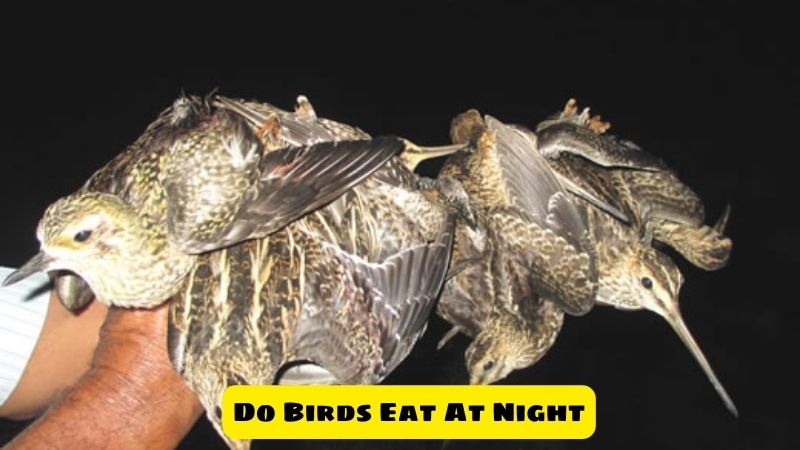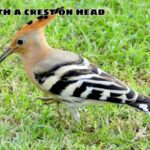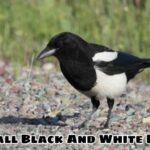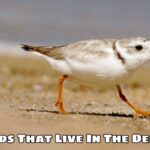Whether or not birds feed at night is a very interesting topic in the study of animal biological behavior. Their adaptation to nighttime feeding habits reflects the diversity and adaptation of species to different habitats. Studies of birds’ nocturnal behavior provide insight into how they optimize their living and foraging activities under the changing light conditions of their natural environments. So join Exoticbirdscorner to learn more details about issues related to do birds eat at night.
Do birds eat at night?
Birds are a class of vertebrate animals, covered with colorful feathers, possessing strong wings and characteristic beaks. They are sky dwellers, flying freely and playing an important role in the ecosystem.
However, hidden behind that beautiful appearance are countless mysteries about the behavior and life of birds. One of the questions that attracts the curiosity of many people is: Do birds eat at night?
This question seems simple but contains many interesting things. We are often familiar with the image of birds chirping to welcome the dawn, or busy searching for food during the day. So what is the reason why some birds choose to be active and forage at night?
The truth is that not all birds sleep at night. Some bird species have the ability to adapt and operate effectively in low light conditions, turning the night into their own “stage” for their foraging and living activities.
Reasons why birds don’t eat at night
Although it contains many mysteries, the bird world is generally still the kingdom of “people who stay up late and get up early”. According to statistics, about 80% of bird species in the world are diurnal animals, active mainly during the day when there is sunlight.
This comes from some biological characteristics of birds:
- Vision: Birds’ eyes are designed to adapt well to daylight, helping them see details and colors clearly. However, birds’ ability to see at night is much worse.
- Food sources: Most of the main food sources of birds such as insects, seeds, fruits,… only appear and are abundant during the day. Therefore, foraging at night will be less effective for birds.
- Activities: Birds use light to navigate, chirp and search for food. Operating at night when there is little light will make it difficult for birds to perform these behaviors.
In addition, birds’ natural biological clock is also regulated by the day-night cycle. Sunlight plays an important role in stimulating the hormone melatonin, which helps birds regulate sleep and wake up in the early morning.
Therefore, it is not surprising that we often see images of birds enthusiastically searching for food, chirping to welcome the dawn or flying in the blue sky during the day.
However, that doesn’t mean all birds sleep at night. There are still some special bird species that are able to adapt and operate effectively in low light conditions, becoming the “night owls” of the bird world.
Some birds are nocturnal
Besides the numerous “night owls” who wake up early, the bird world also contains mysterious and interesting “night owls”. Unlike most birds that sleep at night, these “night owls” possess special abilities that help them operate effectively in low light conditions, turning the night into their own “stage” for searching activities. eat and live.
Owls are typical representatives of “night owls” in the bird world. This bird of prey possesses large round eyes with excellent vision in the dark, helping them easily detect prey even in the dark of night. Owls have sharp hearing, helping them locate prey by sound. Thanks to these advantages, owls become dangerous killers in the dark, contributing to ecological balance.
The Pigeon is also a notable “night owl”. This bird species operates mainly at night to hunt insects and frogs. Unlike owls, barn owls do not have good vision in the dark. However, they possess unique echolocation capabilities. Pigeons make calls and rely on echoes to locate prey, helping them easily catch prey in the dark.
The kingfisher is another “night owl” with impressive hunting skills. This bird feeds mainly at night, using its sharp vision and ability to catch prey underwater to find fish. Kingfishers have waterproof feathers, allowing them to dive deep underwater to catch prey. Thanks to these special skills, kingfishers become excellent hunters in the dark.
In addition, there are a number of other birds such as falcons, small owls… that are also capable of operating and searching for food at night. Each species possesses its own characteristics and adaptive skills, helping them survive and thrive in the mysterious night environment.
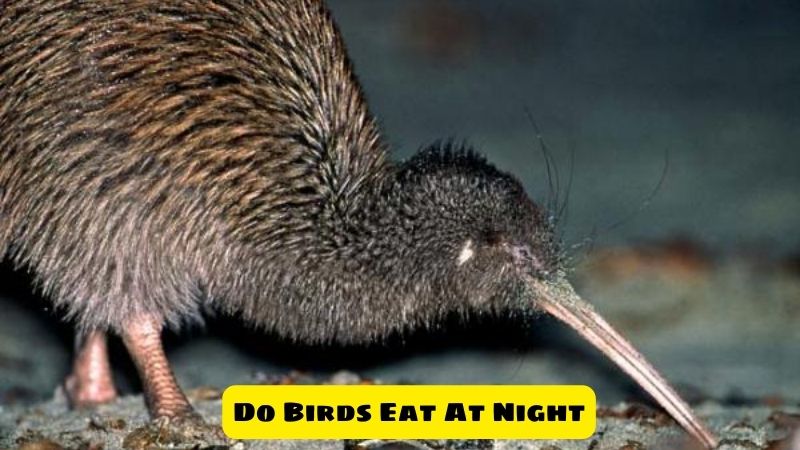
Explain the ability to eat at night in some birds
The ability to eat at night in some bird species is an extremely unique phenomenon and attracts human curiosity. Unlike most birds that sleep at night, these “night owls” can operate and forage effectively in low light conditions. So what created this special ability?
The truth is that the ability to eat at night in birds is the result of a long evolutionary process, helping them adapt to their living environment and food sources. Due to fierce competition from other birds during the day, or food sources that are only abundant at night, some bird species have evolved to maximize this resource.
To be able to operate effectively in the dark, these “night owls” possess special biological characteristics:
- Large eyes: Some birds such as owls have large eyes with many rod cells, helping them see clearly in low light conditions.
- Pointed beak: The beaks of nocturnal birds such as piglets are often pointed and sharp, helping them easily catch prey in the dark.
- Thick plumage: The thick feathers of some birds such as owls help keep the body warm and reduce noise when flying, creating favorable conditions for hunting.
In addition, “night owls” also have special positioning abilities to move and search for prey in the dark:
Owl: This bird has the ability to locate by echolocation. Owls make calls and rely on echoes to locate prey.
Pig birds: Pig birds use their sharp hearing to find prey. Thanks to this ability, the pig bird can detect prey even in the dark of night.
The ability to eat at night is a testament to the diversity and magic of nature. Thanks to special characteristics and adaptive skills, “night owls” in the bird world are able to survive and develop in the mysterious night environment.
Epilogue
Nocturnal birds are a fascinating topic in zoological research, with many species developing nocturnal habits to optimize survival. These species often adapt to changing light environments by hunting, foraging, or performing other activities after dark.
The development of these skills is an effect of evolution, helping them adapt to diverse and different living environments. Learning about the nocturnal habits of birds not only helps us better understand birds but also opens up many opportunities in conservation and management of natural habitats.

